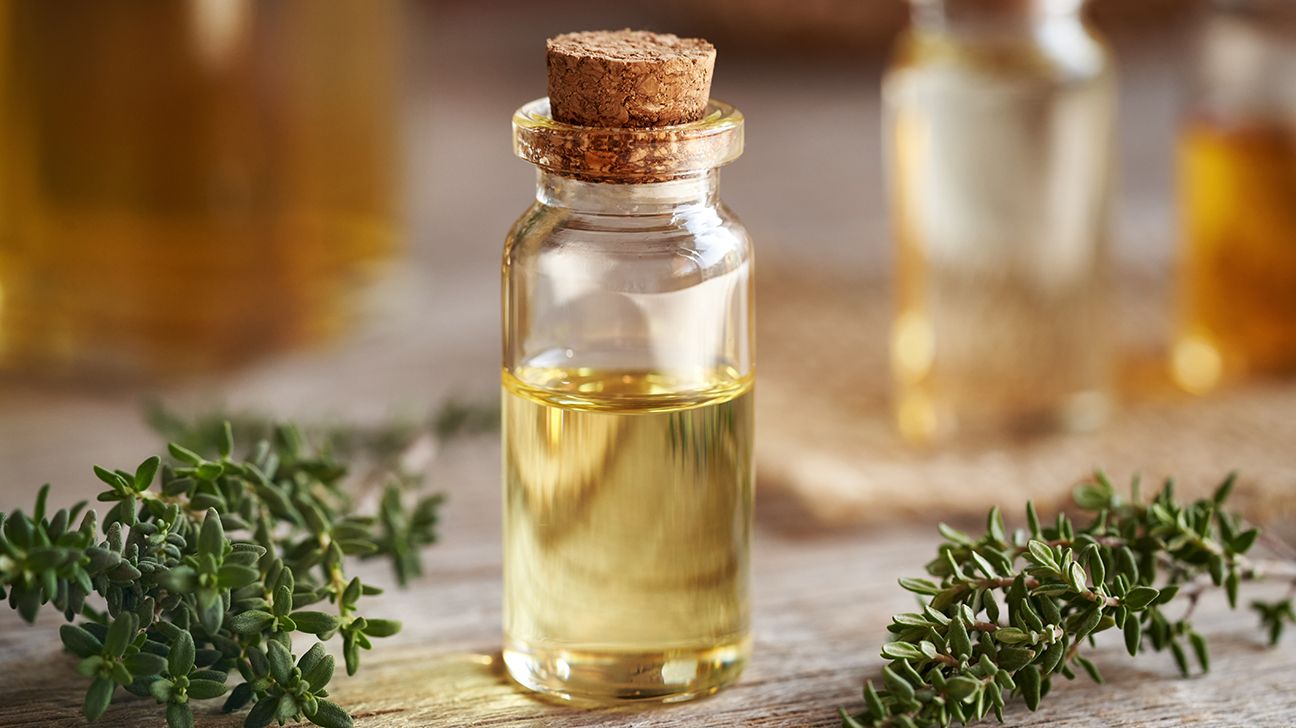Animal and cell culture studies suggest thyme oil may have several health benefits. However, research in humans about its safety and effectiveness is extremely limited.
Thyme oil is commonly used as a preservative in foods, cosmetics, and toiletries. You can also find it as an ingredient in mouthwash. Limited research suggests it may have antifungal, anti-inflammatory, and antibacterial properties. However, very few human studies involving thyme oil exist.
This article examines thyme oil and its uses, the benefits, side effects, and ways to use it.

Before you buy thyme oil, it’s important to know that there is no indication that thyme oil alone will cure any specific disease.
Thyme oil contains compounds that may have health benefits. Examples include:
- carvacrol
- thymol
- linalool
- cineol
- camphor
- borneol
Next, let’s look at the potential health benefits of these compounds.
Acne
However, more research is necessary on humans to understand the effects of thyme oil.
Breast cancer
A 2023 study found that thyme oil may stop the development of the triple-negative breast cancer cell line MDA-MB-231. Essential oils, in general, were found to hinder tumor metastasis or its spreading to other body parts and increase the efficiency of chemotherapy. This study involved cell cultures, and no human studies on thyme oil’s anticancer effects exist.
COVID-19
Thyme oil may help with symptoms of respiratory diseases such as COVID-19. A 2024 study found that using a thyme oil aromatherapy inhaler helped reduce some symptoms of COVID-19, including shortness of breath, cough, and headache.
While aromatherapy using thyme oil may help ease certain symptoms of COVID-19 and other viral illnesses, it won’t treat the underlying condition.
Food preservative
Thyme oil
While these antibacterial properties make thyme oil an effective preservative, it’s not a replacement for antibiotics. Antibiotics treat bacterial infections in humans.
Heart disease
Thyme oil may aid in treating oxidative stress-induced heart disease and generally protect your heart’s health. A 2020 study found that thyme oil protected H2O2 (hydrogen peroxide)-induced biochemical changes in the heart tissue of animals and promoted antioxidant enzymes.
Further studies on humans are necessary.
Oral health
Several studies suggest that thymol (a chemical found in thyme oil) has anti-inflammatory effects. The thymol in thyme oil is effective at reducing inflammation and infection.
Recent
If you have an allergy to mint, you may also have an allergy to thyme and thyme oil.
Some side effects include:
- allergic reactions, ranging from contact dermatitis to hay fever symptoms
- dizziness
- conjunctivitis
- headache
- asthma
- muscle weakness
- gastrointestinal irritation and distress
You should not swallow thyme oil or use undiluted on the skin. Talk with your doctor before using it, especially if you’re pregnant or nursing.
Children should not ingest thyme oil. Consider children and pets who may react to the oil when diffusing essential oils.
Thyme oil is typically obtained from the leaves and flowers of Thymus vulgaris via a steam distillation process. The first distillation produces red thyme essential oil, a heady, dark oil with a spicy scent. Red thyme oil is used as a middle note in perfumery.
If red thyme oil undergoes a second distillation process, a gold-to-pale yellow oil results. This is the most commonly used form of thyme oil and is referred to as thyme oil or white thyme oil.
Thyme oil has shown to benefit several conditions and support heart and oral health. It isn’t meant to be solely for any specific disease but may be beneficial when combined with other treatments.
Other than essential oil, you can find thyme oil in commercially made products, cosmetics, toiletries, and foods. It’s often used as a preservative and as an antimicrobial agent.




